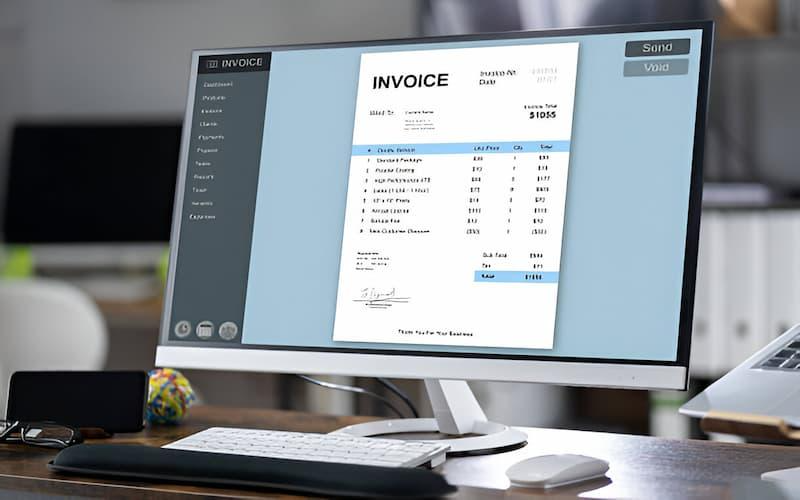Saudi Arabia’s Vision 2030 initiative and ZATCA regulations have fueled the rise of e-invoicing, which is revolutionizing how companies conduct business. Businesses experience better cash flow management, shorter payment cycles, and fewer manual errors when they digitize the invoicing process. Since automated tax reporting guarantees accurate tax submission and reduces the possibility of penalties, this change provides SMEs with a streamlined method to manage tax compliance. Businesses can benefit from advanced analytics and data-driven decision-making while also gaining a solid foundation for broader digital transformation.
Implementing Quickdice ERP can further enhance the benefits of E-invoicing by the integration of invoicing with inventory, finance and procurement system. This unified way of approach not only helps to improve efficiency but also helps to improve data security and compliance with the requirements of the ZATCA. While implementing e-invoicing does have a initial investment in terms of software and secure infrastructure, businesses that make this digital transition are positioning themselves for long-term cost savings, operational efficiency, and preparedness for a modern technology-friendly economy.
Here are some of The Rise of Digital Invoicing and Its Impact on Saudi Businesses.
Vision 2030 and Economic Modernization.
The digital invoicing is one of the major elements of the ambitious Vision 2030 of the Saudi Arabia developed to transform the country into a successful digital economy. The vision of 2030 is based on modernization, attraction of foreign investment, and the establishment of a business-friendly environment with the use of technology to enhance efficiency and transparency. Through the process of digitizing the traditional financial processes, such as invoicing, Saudi Arabia aims to simplify the business operations and to eliminate bureaucratic inefficiencies as well as enabling innovation in industries. This initiative promotes the use of the latest digital tools to all companies regardless of their size and set the stage of the fully integrated digital economy that will advantage both businesses and government agencies.
ZATCA Mandate
E-invoicing in Saudi Arabia has been ordered by the General Authority of Zakat, Tax and customs (ZATCA), and all VAT registered companies are demanded to implement digital invoicing software. This is a staged process whereby compliant invoices are generated initially and subsequently integrated with the electronic systems of ZATCA on a regular basis. Technical requirements that businesses have to comply with include having QR codes, digital signatures and API integration that will guarantee the accuracy, authenticity and traceability of invoices. The ZATCA requirement is also aimed at deterring fraud, increasing taxes transparency, and automating the tax procedure that will help create a more efficient and responsible business environment.
Digital invoice purpose.
The main goal of adopting the digital invoicing is to both modernize the financial processes and enhance the compliance and efficiency. Through automation of invoicing, companies are able to minimize the errors of man, prevent manipulation and keep precise record of the transactions. To the government, e-invoicing enables it to monitor the business activity in real time, to fight tax evasion and to collect taxes in due course. In the case of business, the combination of Quickdice ERP and digital invoicing can offer them an integrated, streamlined system that is compliant with ZATCA without compromising on the operational benefits.
Impact on Businesses
Higher Efficacy and Precision.
Operational efficiency and accuracy is one of the greatest advantages of digital invoicing. Handwriting invoicing can be subject to mistakes, lags and discrepancies. Through the digital systems, employees can so-to-speak automate various repetitive processes, including generating invoices, approving workflows, and tracking payments. This automation minimizes human error, speed-up invoice processing and cuts down payment cycles resulting in improved cash flow management. It is helpful to both the SMEs and the larger enterprises to have a faster operation, reliable records and an increase in productivity.
Cost Savings
Digital invoicing can also be implemented to save a lot of costs. Paper-based invoicing is costly because of printing, paper, postage, and storage. Moving to digital invoices does not only remove these expenses, but also lessens the administrative labor that goes into manual processing. Such savings can be channelled over the years into other strategic areas of investment like improving business analytics, digital marketing or expanding operations. The savings are even increased with the help of such platforms as Quickdice ERP that consolidates invoicing with financial, procurement, and inventory modules, forming a single ecosystem that simplifies the functioning of the entire business.
Enhanced Compliance
E-invoicing is extremely effective in terms of the regulatory compliance as this technology will help to make sure that businesses comply with the strict technical and procedural standards of ZATCA. Any violation of such regulations may lead to punishment, auditing and even suspension of operations. Digital invoicing systems will automatically create compliant invoices and can keep accurate digital records, minimizing the risk of non-compliance. Having in-built validation tools, error check features and reporting capabilities, companies can be assured to comply with regulatory requirements with a minimum manual work.
The Digital Transformation Foundation.
Digital invoicing goes beyond compliance and is an essential action toward wider digital transformation. The digital data generated by the invoices can be used by the businesses to make use of analytics, financial forecasting, and strategic decision-making. The combined systems such as Quickdice ERP enable organizations to connect the invoicing to inventory and procurement and the general accounting. It offers more visibility on operations and allows companies to make informed decisions, optimize resources and find areas to grow.
Data Security
Digital invoicing contributes to the safety of business sensitive data as well. ZATCA demands the use of safe encryption requirements so that financial data could be secured in the course of transmission and storage. Most new digital invoicing systems apply sophisticated security protocols such as blockchain technology to offer transparency, immutability and security against fraud. Companies that value data security are not only able to satisfy regulations but also earn confidence in clients, partners, and other stakeholders.
Challenges for SMEs
Although digital invoicing advantages are obvious, small- and middle-sized businesses have some difficulties. The introduction of E-invoicing in Saudi Arabia will involve spending on software compatible with the practice, secure infrastructure, and training of employees. The technical barriers that could be faced by SMEs during the integration of their systems with ZATCA or available ERP systems may also be encountered. Solutions such as Quickdice ERP can solve these issues by providing scalable solutions that are easy to use and suitable to any business size to enable SMEs to implement digital invoicing in an appropriate manner without losing compliance and operational efficiency.
Conclusion
Digital invoicing is changing the Saudi business environment. Companies will be in a position to save time, achieve accuracy and comply with the regulations by embracing automated options rather than manual paper work. The most significant instrument of this change is the tools such as Quickdice ERP which provide the features that make the financial processes easier and stimulate stable development. Companies that adopt E-invoicing in Saudi Arabia will be able to save on costs, increase their levels of security, and better manage their cash flow to ensure they remain competitive over a long period of time.
In the modern dynamic business world, the process of digital invoicing is not only a technological upgrade, but a need. Business organizations with a higher degree of ERP solutions such as the Quickdice ERP have better chances to remain in line with the regulatory provisions, integrate operations, and expand their business effectively. With the shift to the promotion of digital transformation among Saudi Arabia, the adoption of E-invoicing is the key to the contemporary, robust, and progressive business operations.



